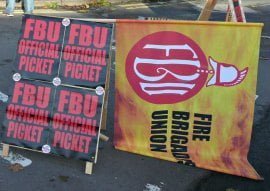At a special conference on Friday 27th November, the Fire Brigades Union (FBU) made a historic move to re-affiliate to the Labour Party after more than a decade of being outside of the party. The FBU’s decision marks a strengthening of the Corbyn movement and a step forward in the process of reclaiming the Labour Party from the Blairites.
At a special conference in Blackpool on Friday 27th November, the Fire Brigades Union (FBU) made a historic move to re-affiliate to the Labour Party after more than a decade of being outside of the party.
Delegates, on a show of hands, voted overwhelmingly for the union to support the transformed Labour Party, which had been renewed following the election of Jeremy Corbyn as leader.
Matt Wrack, FBU general secretary, commenting on the decision of his union, said:
“Firefighters recognise that the Labour party has changed for the better since the election of Jeremy Corbyn, who has given our members and supporters hope that we can shift the political debate in favour of working people. We have a Labour Party leader and shadow chancellor who are vehemently opposed to austerity, who are ready to fight for a fair alternative that doesn’t attack the living standards, livelihoods and the hard won rights of working people.
“Since the Tories came to power, initially in coalition with the Liberal Democrats, 7,000 firefighter jobs have been cut and more than 40 fire stations have closed, with almost 145 fire engines pulled from service up to 2013 alone. Last week, the government’s own figures showed we have the longest 999 response times to fires for 20 years. Firefighters, like millions of others, have had their pensions attacked and their living standards driven down by George Osborne’s pay freeze.
“The best chance we have of halting the now critical cuts to fire and rescue services and to fight for better conditions for firefighters and all working people is to defeat the cuts agenda outright and work to elect an anti-austerity party to government.”
The FBU was one of the first trade unions to declare support for Corbyn’s Labour leadership campaign. The union’s executive council voted to recommend re-affiliation as a result of his landslide election victory. In addition, Jeremy Corbyn and shadow chancellor John McDonnell had co-founded the unions’ parliamentary group after the union separated from Labour in 2004 after a dispute over pay and conditions resulted in a bitter clash under the Blair government.
It was out of revulsion with the way in which the Labour Party under Tony Blair was being taken, and they way they were treated, that the union voted to disaffiliate.
Jeremy Corbyn welcomed the FBU decision, saying their vote to reaffiliate marked a “milestone in the building of our new politics and our labour movement.”
There had been some reservations, which was inevitable, given the deep-seated hatred for Labour under Blair; but the majority recognised the decisive change that a Corbyn victory had opened up.
The strongest opposition to reaffiliation came from the FBU’s Scottish region, which was understandable given the independence referendum last year, where Labour climbed into bed with the Tories, and Labour’s crushing defeat in the general election at the hands of the SNP in May. The union made clear the Scottish region’s position would be respected, saying that it will not use political fund money from Scotland or Northern Ireland to support affiliation.
Some delegates also raised doubts about whether Corbyn would last in the leadership, but their concerns were answered by the need for the FBU to help consolidate his position by reaffiliating. Matt Wrack explained: “You have to assess the situation at the time. If [he is removed], it would be an outrage against democracy. People would react.” He attacked the Labour right wing’s undemocratic actions.
The union’s London region secretary Paul Embery, who had opposed reaffiliation at the FBU conference in May this year, said it was “absolutely the right decision at the right time.”
He said the union would “seek to play our part at every level” and he urged Labour MPs to “respect the mandate of the new leadership and stop the constant sniping and the attempts to deliberately destabilise it.”
Jeremy Corbyn quickly welcomed the union back into the fold:
“There are 38,000 men and women members working in 2,030 fire stations across the country who have been at the sharp end of austerity cuts,” he said. “I thank the FBU for this vote of confidence in our new politics which believes investing in our public services is a matter of national pride.
“Our national executive committee will now deal with the formalities, but to those FBU members who are now in a Labour-affiliating union for the first time, I look forward to extending a warm welcome.
“And to those who are coming back to Labour with the union, I say welcome home.”
This historic decision will undoubtedly give a further impetus to the RMT, the rail union which was expelled from the party under Blair, to reaffiliate to the Labour Party at its next annual conference.






